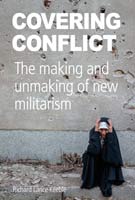|
In Covering conflict: The making and unmaking of new militarism, Richard Lance Keeble presents a highly original, critical overview of the UK press’s coverage of wars since 1945. The US-led attacks on Iraq in 1991, Afghanistan in 2001 and Iraq in 2003 were conceived in ‘new militarist’ terms - in that they were quickly concluded with ‘victories’ rapidly proclaimed against relatively puny opposition. Yet since 2001, Western military adventures wasting billions of pounds and dollars (which could so easily have been directed at socially useful projects) have turned into appalling quagmires - leading to massive civilian casualties, unprecedented refugee crises and levels of joblessness. New militarism has been transformed into disaster militarism.
Secrecy lies at the heart of the UK’s foreign and domestic strategies. Thus, in a major contextualising chapter, Keeble explores the complex links between Fleet Street and the secret state. Other areas examined include:
- The Falklands/Malvinas conflict and the creation of the new militarist consensus.
- The demonisation of dictators such as Saddam Hussein, of Iraq, Col. Gaddafi, of Libya, and Slobadan Miloševic, of Serbia.
- The symbolic significance of the censorship regime during the Gulf conflict of 1991.
- The press and the manufacture of humanitarian warfare: Iraq in the 1990s, Somalia and the war against Yugoslavia 1999.
- The myth of Gulf War 2 of 2003.
Keeble draws from a vast range of sources: interviews with journalists, theoretical approaches, autobiographies, biographies, histories of the secret state, secret warfare and the Middle East, academic journals, newspapers, magazines - and mainstream and alternative/progressive/peace movement websites. |

